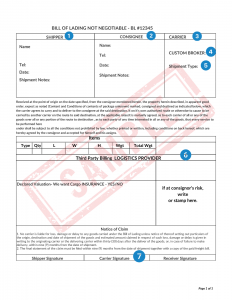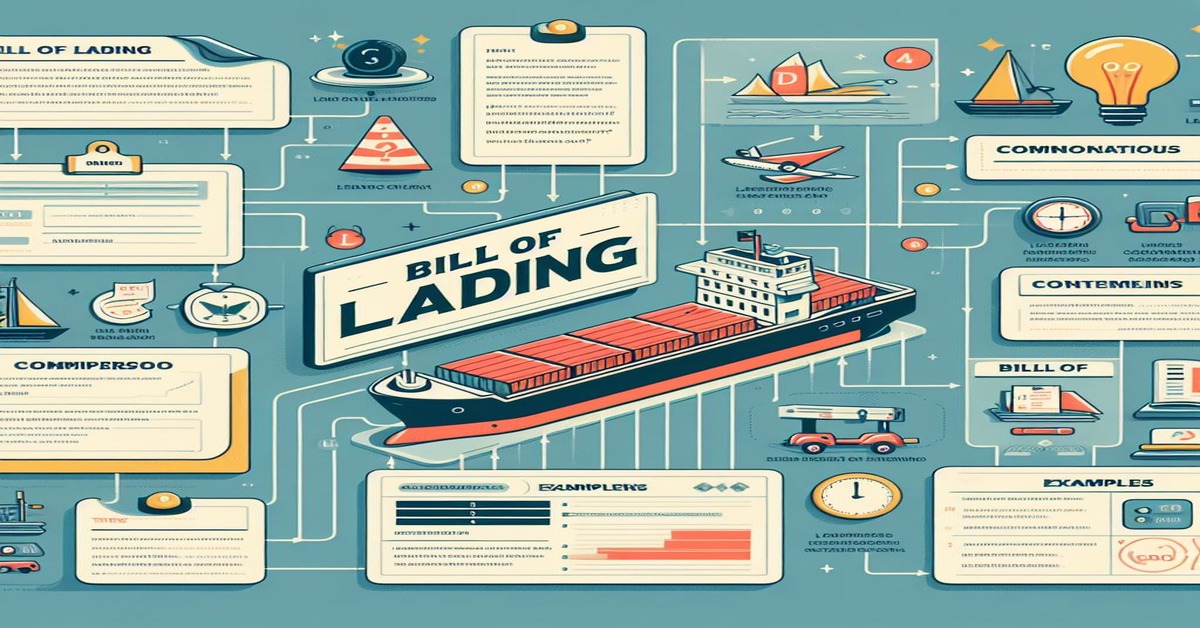Learn the basics of the bill of lading and improve your shipping process. We’ve developed this article to share the importance of a Bill of Lading (BOL), its functions, and provide real-life examples to shed light on its significance.
Welcome to the world of shipping! At its core lies a crucial document known as the ‘bill of lading.’ In this introduction, we’ll unravel its basics, offering you a clear understanding of this essential component in the shipping industry.
If you are new to shipping, logistics freight or just need a refresher, we have developed this article to share the importance of a Bill of Lading (BOL), its functions, and provide real-life examples to shed light on its significance.
Now, let’s get to it!
In need of a logistics quote? Don’t delay!
Click here to send us an email and receive your personalized quote within the hour!
What is a Bill of Lading (BOL)?
A Bill of Lading, often abbreviated as BOL, is a legal document issued by a carrier or logistics broker to a shipper. It serves as a contract of carriage, a receipt of goods, and evidence of ownership for the goods being transported. The BOL contains critical information about the shipment and can be used as a shipping label throughout the shipping process
What are the types of Bill of Lading (BOL)?
There are different types of BOLs, each serving specific purposes within the shipping industry. Some common types include:
Straight Bill of Lading: This is the most common type, where the goods are consigned to a specific recipient and are not negotiable.
Electronic Bill of Lading (eBOL): A digital alternative to the traditional paper-based BOL, offering efficiency and convenience.
What is the function of a Bill of Lading (BOL)?
The Bill of Lading serves multiple functions that contribute to the smooth execution of shipping operations. These functions include:
- Receipt of Goods: Provides proof of goods received by the carrier, ensuring accountability and minimizing disputes regarding the quantity, condition, and packaging of the goods.
- Title and Ownership: Establishes legal ownership of the goods by including the consignee’s name, enabling a smooth transfer of ownership during transit.
- Proof of Delivery: Serves as crucial evidence of successful delivery, facilitating invoicing, payment, and insurance claims.
- Terms and Conditions: Outlines important terms and conditions related to the shipment, ensuring a clear understanding between the shipper and the carrier and minimizing potential disputes.
- Customs Clearance: Provides essential information to customs authorities, facilitating efficient customs clearance.
- Disputes and Claims: Acts as a valuable record of the shipment, helping in resolving conflicts by providing evidence of the agreed-upon terms and conditions.
To enhance understanding, we have provided an example of a typical Bill of Lading.

The example showcases the various sections and information included in a BOL.
- Shipper: The Shipper is the party or company that initiates the shipment. They are responsible for sending the goods. Shipper details on the bill of lading include the name and address of the shipper’s company, as well as contact information
- Consignee: The Consignee is the recipient of the cargo, the party to whom the goods will be delivered. On the bill of lading, you provide the name and address of the consignee, along with their contact information.
- Carrier: The Carrier is the entity or company responsible for physically transporting the goods from the shipper to the consignee. The bill of lading should include the carrier’s name and address, and it may also have a section for the carrier’s signature, indicating their acceptance of the goods for transport.
- Customs Broker: A Customs Broker is a licensed professional or firm that helps navigate the customs clearance process. They ensure that goods comply with customs regulations and facilitate the smooth passage of goods through customs. While customs broker details are not typically included on a bill of lading, they are often involved in the import/export process.
- Shipment Type: The Shipment Type refers to the classification of the cargo being shipped. It could be, for example, a description of whether it’s a full truck load (FTL) or less than truck load (LTL), or it could specify the type of cargo (e.g., hazardous, perishable, or general goods). This information helps the carrier and others handling the shipment understand its nature.
- Third-Party Shipping Logistics Provider: A Third-Party Shipping Logistics Provider is an entity separate from the shipper and the carrier that offers logistics and shipping services. They might coordinate various aspects of the transportation process, such as warehousing, distribution, and customs clearance. While their information may not be on the bill of lading, they play a role in managing the logistics.
- Shipper, Carrier, Receiver Signature: Signatures in the bill of lading are a critical part of the document. The Shipper, Carrier, and Receiver typically sign the bill of lading to acknowledge their roles, responsibilities, and acceptance of the terms and conditions of the shipment. These signatures confirm the contract and help ensure accountability and proper handling of the cargo.
These elements collectively make up a comprehensive bill of lading, which is essential in documenting and ensuring the successful transportation of goods in the shipping and logistics industry.
Simplified shipping convenience with FlagShip
We understand that shipping can be a complex and time-consuming process for many businesses. That’s why we are constantly working to improve our system and make it more convenient for our clients. Such as, downloading the BOL directly from our shipping system, saving you time in the shipping process.
For a reliable and cost-effective shipping partner, choose FlagShip. Access our diverse shipping solutions, including freight LTL/FTL, courier, and international services.
Create and manage BOLs online easily with FlagShip.
Don’t have an account? Simply click here to get started
Easily compare carrier rates, track shipments, and connect with our dedicated customer service team.
For FlagShip’s Freight Logistics Services, email us at dispatch@flagshipcompany.com or call 1-866-320-8383. Our friendly team is ready to address your shipping inquiries promptly.

